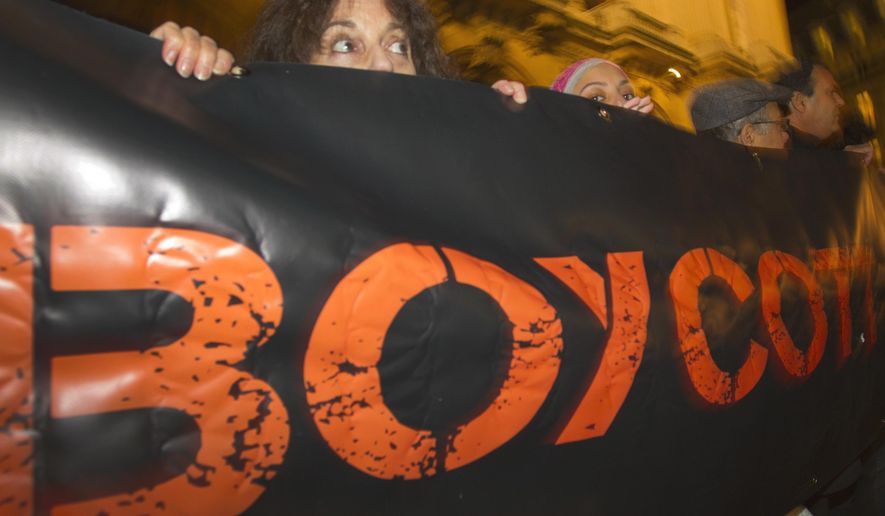PARIS (AP) - The European Court of Human Rights ruled Thursday that France violated the freedom of expression of pro-Palestinian activists who were convicted for campaigning against Israeli goods.
The court ordered the French government to pay 101,000 euros ($115,000) in overall damages to a group of 11 activists. The global Boycott, Divestment and Sanctions movement hailed the court’s decision as a major victory.
The protesters, led by French activist Jean-Michel Baldassi, were convicted of incitement to economic discrimination after taking part in a 2009 demonstration at a hypermarket in the eastern French town of Illzach and handing out leaflets calling for a boycott of Israeli products. France’s top court upheld the conviction.
But the European human rights court found that the criminal conviction “had no relevant and sufficient grounds” and violated the freedom of expression of the protesters. The court is based in the French city of Strasbourg, and countries that signed the European Convention on Human Rights – including France - are bound by its rulings.
“This momentous court ruling is a decisive victory for freedom of expression, for human rights defenders, and for the BDS movement for Palestinian freedom, justice and equality,” Rita Ahmad from the Palestinian-led BDS movement said in a statement.
The BDS movement has called for boycotts against Israeli businesses, universities and cultural institutions in what it says is a nonviolent campaign against Israeli abuses against Palestinians. Israel says the movement masks its motives to delegitimize or destroy the Jewish state.
Israel and its supporters have promoted a number of anti-BDS legislative initiatives overseas, particularly in the U.S. and Europe.
The U.S. House of Representatives passed a bipartisan resolution last year condemning the boycott-Israel movement as damaging to peace efforts. And German lawmakers approved a resolution last year describing the movement’s methods as anti-Semitic and reminiscent of Nazi-era calls to boycott Jews.
BDS activists deny the anti-Semitism charges, and say discrimination laws have been used to unfairly target them.
In the French case, the human rights court described the protesters’ actions as a form of political expression and a subject of public interest. It noted that Article 10 of the human rights charter, which guarantees freedom of expression, allows for such protest action as long as it doesn’t “cross the line and turn into a call for violence, hatred or intolerance.”
The French government has three months to appeal the decision, but did not immediately comment Thursday.
Thursday’s decision followed a 2016 statement by the EU’s foreign affairs chief at the time, Federica Mogherini, who said that BDS activities were protected by the freedom of expression, even though the EU opposes BDS’s attempts to isolate Israel.
Amnesty International expressed hope that the ruling would “send a clear message to all European states that they must stop the prosecution of peaceful activists.”




Please read our comment policy before commenting.